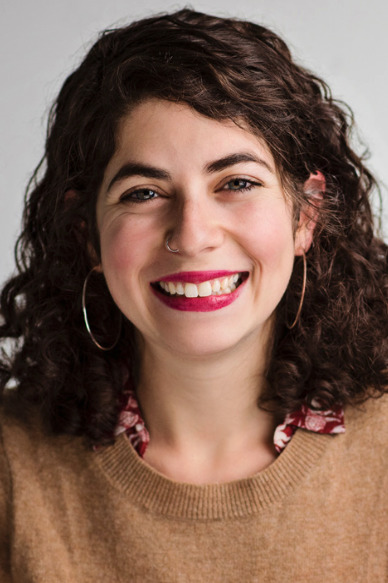
Expressive arts therapist, teacher, and theatre loverJoyce Gendler ’08
Social Justice Education Through the Arts Degree from NYU’s Gallatin School of Individualized Study
“In a world where you’re expected to go from A to B then C, McLean helped me understand that the line between them might be a little squiggly sometimes,” says Joyce Gendler. “Lucky for me, I love squiggly lines — they’re a lot more interesting.”
It’s no surprise that Joyce thinks like an artist — for as long as she can remember, the arts have played a huge role in her life. “My mother was an art teacher, and I was always doing plays and other artistic stuff,” she says. “It was such an important part of my learning.”
Joyce recalls that her teachers not only took an interest in her love of all things theater, but created opportunities for her to integrate it with her studies — like the time she was given permission to write a play instead of a paper. “It helped me realize that if you ask for something and advocate for your needs, most of the time you can make it happen.”
After graduating from McLean, Joyce went on to pursue educational theater at New York University, where experiences as a student teacher opened her eyes — and she set her sights in a new direction. “I was quickly becoming aware of how fortunate I had been as a student, and how our public education system doesn’t support everyone in it,” she says. “I became pretty obsessed with the injustices I saw, and that became more of a focus for me than the theater.” Joyce transferred to NYU’s Gallatin School of Individualized Study and created her own major, social justice education through the arts, graduating in 2012.
Her first job was teaching a social/ emotional class to high school-age students incarcerated at Riker’s Island, the prison where she’d done some work as an undergrad as part of a class. “New York is one of just two states that tries 16 to 18 year olds as adults in the court system,” she explains. “Working there, I was seeing them at a time in their lives when so many other interventions had failed them. I was like ‘what can we be doing in the schools so that this doesn’t happen?’”
Joyce’s quest for answers led her to nonprofit work with an organization called The Future Project where she was a Dream Director — “best title ever!” — working in high schools with students and teachers to create a positive school culture. “The idea is that when kids can learn by pursuing things they’re excited about, like creating a comic book or recording a song” — or writing a play instead of a paper? — “it shifts the energy of what school can be, and grades and attendance and morale go up.” During her time there, Joyce met her now-husband John-Michael and was promoted to lead the team of Dream Directors. In 2017, Joyce left for graduate school at Lesley University in Boston, where she studied clinical mental health counseling and expressive arts therapy.
“The arts had given me a way to understand myself and the world,” says Joyce, “and when I realized I could combine education and the arts in this way it was like OMG! That was my story.”
Joyce and John-Michael recently bought a house by the water in Connecticut, where she works as an expressive arts therapist at a community agency for adults with chronic mental health issues. “I’ve always worked with adolescents, and hope to again, but with a different perspective now that I see what life looks like 10 or 20 or 40 years down the road for people who grapple with some of these same things.”
As she reflects on her own squiggly-line journey, Joyce is grateful to McLean for helping her to become the person she is today, personally and professionally. “If I hadn’t had such a supportive community of people who saw my abilities instead of my disabilities, my life would have been totally different and I’ve had a glimpse of what that can look like,” she says. “McLean was a safe place where I was celebrated for literally all of who I was, including the parts of myself I felt shame around.”
“Now, working with people who struggle with their own diagnoses and challenges,” she adds, “I see just how much the right support along the way make all the difference.”